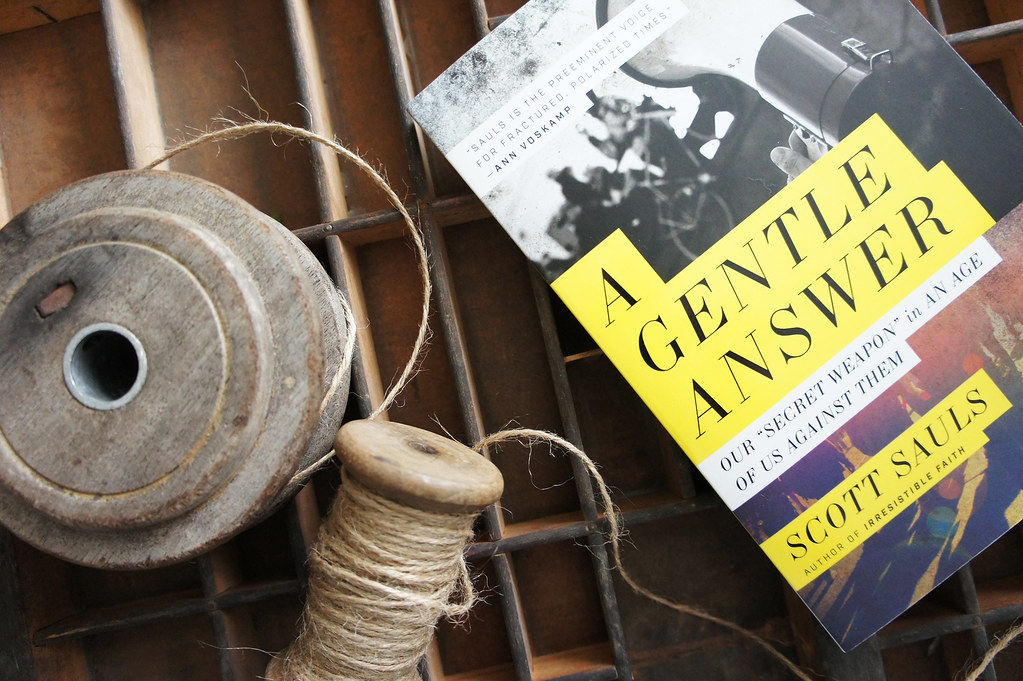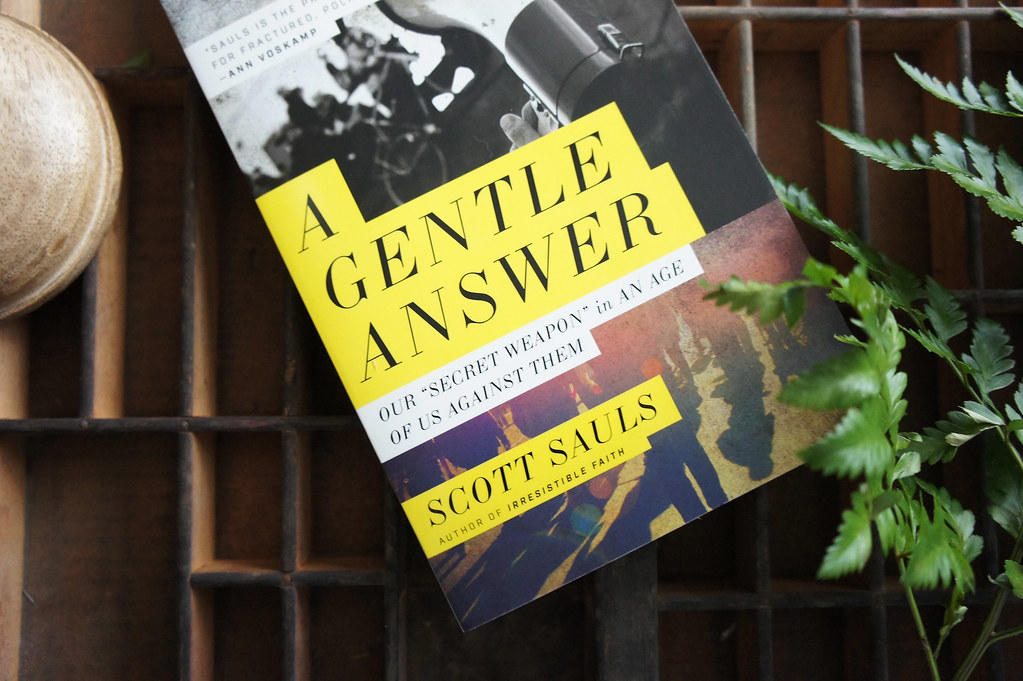Scott Sauls is the preeminent voice for fractured, polarized times. No voice speaks with such fresh hope, clarifying wisdom, rooted orthodoxy, all from a posture of unifying grace. I have said often that books by Scott Sauls should be in the hands of every single Christian without exception. About Scott’s latest offering, A Gentle Answer: Our ‘Secret Weapon’ in an Age of Us-Against-Them, Paul Tripp has said, “In a culture that glories in outrage, I can’t think of a more needed and timely book than this one.” Very few pastors or theologians have more spiritually formed our family than Scott, and his every word is read under our roof. And very few books could change the conversation around our office watering holes, our family dinner tables, and across our aisles and fences across the globe like this one. And so, it gives us joy to welcome our friend, Scott Sauls, to the farm’s front porch today…
The man Nathanael was skeptical of Jesus, until he wasn’t.
As others speculated about whether or not Jesus was the long-awaited Messiah, Nathanael famously asked, “Can anything good come out of Nazareth?” (John 1:46)
Nazareth, the place of Jesus’ upbringing, was a small and obscure town, not known for churning out movers and shakers, let alone the King of the World. Based on place of origin alone, Nathanael wrote Jesus off.
But this skeptic’s posture swiftly shifted when Jesus, whom he had never actually met, declared, “I saw you under the fig tree,” to which Nathanael responded, “Rabbi, you are the Son of God; you are the King of Israel!” (John 1:48-49)
Why the sudden shift? What, exactly, did Jesus see under that mysterious fig tree?
It could have been something wonderful, like a hidden virtue.
Perhaps Nathanael had been praying under the tree, or making a vow, or feeding a hungry man, or defending a weaker person against a bully, or donating new clothes to a poor woman, or talking a teenager out of committing self-harm, or forgiving an enemy.
Or Jesus could have seen hidden pain in Nathanael under that fig tree.
Perhaps it was the place where Nathanael first became a victim of abuse, cried out to a silent sky about how lonely he was, or tried to end his own life, or felt the despair of anxiety or depression or financial ruin, or was given a crippling diagnosis, or was abandoned by his wife, or buried a child.
Or Jesus could have seen Nathanael committing a heinous sin that was hidden from the rest of the world.








Perhaps beneath the fig tree was where Nathanael berated and bullied a child, or committed a crime, or passed out drunk, or told an injurious lie, or committed a murder, or solicited a prostitute, or committed blasphemy.
We just don’t know what Jesus observed in that moment.
However, when Nathanael responded in awe over the fact that Jesus had seen him under the fig tree, Jesus assured him that the best was still to come: “You will see greater things than these.” Indeed, Nathanael would see heaven opened and the angels of God ascending and descending on the Son of Man (John 1:50-51).
In other words, Nathanael would see the face of God, in all of His glory and splendor.
Philip, the friend who first introduced Nathanael to Jesus, was also promised greater things. When Philip later asked Jesus to “show us the Father,” Jesus responded, “Truly, truly, I say to you, whoever believes in me will also do the works that I do; and greater works than these will he do” (John 14:12).
What are these greater works that Jesus spoke of?
What could be an even greater work than turning water into wine, walking on water, telling a paralytic to rise up and walk, or giving sight to a blind man?
Perhaps the greater works are things such as Nathanael the cynic becoming a loyal follower who calls Jesus Rabbi, or a wavering Peter doing something courageous and bold, or a poor widow giving away her two coins at the temple, or a violent and racist Saul becoming a reconciling mediator between Jews and Gentiles.
Perhaps greater works are the works done in our own lives through Jesus’s strength, such as loving one person for better and for worse, in sickness and in health, in joy and in sorrow, as long as we both shall live.
Perhaps greater works include saying no to a doctor’s recommendation to abort a child with special needs and yes to raising and loving that child.
Perhaps greater works include pursuing understanding, reconciliation, justice, peace, and friendship with people from another race, culture, political persuasion, economic group, or generation whom you wouldn’t otherwise be able to get along with outside of Christ.
Perhaps greater works include staying at the same church for years or even decades, even during seasons of difficulty or decline.
Or perhaps greater works include responding to hurtful treatment with a gentle answer that turns away wrath. (Proverbs 15:1)
In the fall of 2006, a Pennsylvania milk truck driver named Charles Carl Roberts IV burst into a one-room, Amish schoolhouse and opened fire on a classroom of girls, killing five and severely injuring five more. After this, he turned the gun on himself and took his own life.
In his suicide note, Mr. Roberts confessed that he had been secretly tormented for many years by two dark spots from his own past.
The first was the memory of how he had molested two of his younger relatives twenty years before. The second was the memory of losing his own daughter, who had died nine years previously. The loss of his child led Mr. Roberts to also confess in his note that he hated God.
There were two groups of people in attendance at his funeral.
The first was the expected group: his family and friends of his family, who sat somber and shocked over what had happened. The second was a group of about thirty men, women, and children from the Amish community whose daughters Roberts had murdered and injured.
Commenting on the series of events, nearby sociologist and college professor Donald Kraybull remarked that “the most powerful demonstration of the depth of Amish forgiveness was when members of the Amish community went to the killer’s burial service…Several families, Amish families who had buried their own daughters just the day before were in attendance and they hugged the widow, and hugged other members of the killer’s family.”
It was also reported that this Amish community had donated money to cover expenses, including funeral costs, for the killer’s widow and three children.
Then, as would be the case for any community after enduring such horrific loss, the Amish returned home where they would be “better able to concentrate on the work of their own healing.”
When I first read this modern-day account of “greater works than these,” I couldn’t help but remember the famous quote from Dr. Martin Luther King Jr. as he eloquently explained the rationale behind his philosophy of protesting injustice by acts of peaceful resistance.
King said, “Returning violence for violence multiplies violence, adding deeper darkness to a night already devoid of stars. Darkness cannot drive out darkness: only light can do that. Hate cannot drive out hate: only love can do that.”
This is a gift of love packaged in a gentle yet powerful answer.
How do imperfect, frail human beings find the resources to heal from distancing and rejection, to respond to such violence with such love, and to commit to “work on their own healing” instead of retaliating with their own forms of aggression?
I believe the answer rests in a short statement made by the beloved disciple, John, who said that we love (even our enemies) because Jesus first loved us (1 John 4:19).
Paul, likewise, reminds us that we only have the resources to forgive others because Christ has first forgiven us (Eph. 4:32).
To gain strength and courage to offer a gentle answer, we must first be flooded by the reality that we’ve already received one.
Scott Sauls is senior pastor of Christ Presbyterian Church in Nashville, Tennessee, where he lives with his lovely wife, Patti, and daughters, Abby and Ellie. He blogs regularly—seriously bookmark him—and can be found being humble light on Twitter, Instagram, and Facebook.About A Gentle Answer, Jen Pollock Michel has said, “This is an urgent book for our fractured times, calling us to rigorous self-examination and the gentle way of Jesus. Sauls is just the kind of voice we need in evangelicalism today.”
I humbly concur. A Gentle Answer is a roadmap, first into the gentle heart of Jesus, and then into a world that is aching for a gentle answer to bring relief from the hostility and noise. This is an absolute must-read that I cannot recommend highly enough.









